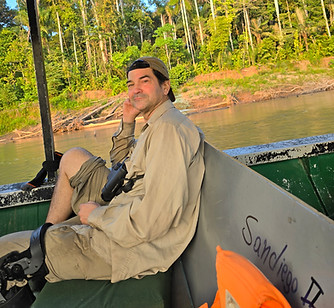PEOPLE


Advancing Inclusive
Mentoring Program
Ari Martínez
Assistant Professor
Department of Ecology & Evolutionary Biology
University of California at Santa Cruz
National Geographic Explorer
Dr. Ari Martínez is an Assistant Professor in the Department of Ecology and Evolutionary Biology at the University of California, Santa Cruz, and the Director of the Forest Fear Lab. His research focuses on how social information, particularly regarding predation risk, influences species interactions and community dynamics. He investigates the roles of different species in providing information about predators, how this information varies across environmental gradients, and the evolutionary history that shapes these behaviors.
Dr. Martínez's lab combines natural history, field experiments, and phylogenetic tools to address these questions. Current projects include studying heterospecific eavesdropping, changes in social information use across urban-rural gradients, and the roles of biotic processes in determining community stability in tropical ecosystems.
He has published extensively in top-tier journals and has been cited over 800 times. His work has significantly advanced understanding of the "landscape of fear" and its impact on biodiversity.
Revealing
the birds' responses
to terrestrial
predators !

© Allene Henderson

Dr. Samuel Lopes Oliveira. He/his
Research Assistant
Lab manager, UCSC
He is the Lab Manager at the Forest Fear Lab and a conservation biologist specializing in Neotropical and migratory birds. He completed his undergraduate and Master’s degrees in Brazil, focusing on ecology and bird conservation, and began his graduate studies in Forest Science at Michigan Tech in 2017. He has conducted multiple field seasons studying migratory birds that breed in North America and winter in tropical working landscapes, including coffee, cacao, and oil palm plantations, as well as small forest fragments in Costa Rica.
His research aims to understand how managed and fragmented habitats support wintering migratory birds and to inform conservation strategies. He is committed to applied conservation and capacity-building, offering training in bird banding and research methods to local scientists to strengthen local knowledge and conservation efforts for declining migratory birds in the tropics.

Dr. Justin Wheeler Baldwin
Postdoctoral Researcher, UCSC
Antipredator behavior of tropical birds at nests
In the Forest Fear Lab, he works on long-term collaborations with Dr. Gustavo Londoño and Dr. Juan Pablo Gomez, studying how birds respond to forest predators at their nests using experimental and observational data collected over decades. He integrates different sources of data to tell scientific stories and assists with data analysis on several lab projects, particularly the theses of Will, Vince, and Allene.
When not at the computer, he enjoys nest searching, using power tools, and helping set up the lab’s new Colombian field site. Building on his master’s and PhD work, he remains interested in state-space movement models with automated radio telemetry data and thermal adaptation sensu lato. Outside the lab, he can be found running with his dog Caramela, birding, and mountain biking. More information is available at: www.justinbaldwin.name

CURRENT GRADUATE STUDENTS

Andres Felipe Tigreros
Ph.D. Student, UCSC
He is a Colombian biologist, his research interests include ecology, conservation biology, evolution, behavioral ecology, animal ecology, and biodiversity.
At the Forest Fear Lab, his work focuses on understanding the causes and consequences of social information for species interactions, especially regarding predation risk. He studies how different species contribute to and use predator-related information, how this varies across environmental gradients, and how evolutionary history shapes these behaviors.
Andrés has contributed to several publications, including a technical report on the Canada Warbler in Colombia and the first record of the Clay-colored Sparrow in South America. He is dedicated to applied conservation and capacity-building, training local scientists in bird banding and research methods to support the conservation of declining migratory birds in the tropics.

Lina Peña Ramirez
Ph.D. Student, UCSC
She is a Colombian biologist, ornithologist, and passionate bird photographer. In 2017, she discovered a new bird species in Colombia, the "Tororoi Bailador" or "Salsita." Her work has contributed to projects in Colombia and abroad, including studies on gradient ecology, temperature effects on cognition in South Africa, and social behavior of Red-Winged Fairy Wrens in Western Australia.
Her research interests span ecology, evolution, reproductive biology, and physiological adaptations of birds to environmental changes. She is also passionate about outreach and training local communities, linking people to science to support ecosystem conservation.
At the Forest Fear Lab at UCSC, led by Dr. Ari Martínez, she studies the influence of migration on social learning and the role of resident species in shaping migrants’ anti-predator behavior in tropical forests.
More in: www. Lina Peña .com

Discovering the Peruvian Amazon.
CURRENT UNDERGRAD STUDENTS

Seleona Hunter-Selesitino (She/Her/Her's)
Undergraduate Student, UCSC
She is currently researching bird territory composition in the coastal sage scrub community at UCSC’s coastal campus. She also assists with studies on information transfer about predators and flock composition (mixed or not) outside the breeding season. Her fieldwork includes spot-mapping surveys for Song Sparrows, Spotted Towhees, and California Towhees, training target species for color banding, and tracking flock movements.
She also processes data using acoustic analysis and QGIS. Outside of research, she enjoys drawing, dancing (cumbia, bellydance, and Tahitian), and drumming (Arabic, Tahitian, and African). Her career interests include avian conservation in the Samoan Islands and the behavioral ecology of tropical birds.
.jpg)
Bailey Tregembo, She/Her
Undergraduate Student, Ecology and Evolution B.S.at UCSC
Bailey is a first-generation college student who has had a lifelong obsession with the natural sciences. Her love for birding brought her to the Forest Fear lab. Bailey's research has been focused on the anti-predator behaviors and insularity-driven changes of the Island-Scrub jay, an endemic bird species native to Santa Cruz Island.
LAB ALUMNI

Allene Hendersen, M.S. UCSC
Behavioral Ecology
Allene is a first-generation Chilean-American UCSC master's student with years of experience working with endangered Hawaiian seabirds. Allene focused on referential information in Peruvian Amazon mixed-species flocks, she is very excited to tie her career in ecology to her South American roots.


Allene launching the aerial predator!
Listen to how the birds respond!
© Allene Henderson
© Andres Tigreros

Chelsey Hunts, M.S. UCSC
Behavioral Ecology
Chelsey found her love of birds and the tropics during her first field job in Costa Rica working studying the spatial ecology of toucans. Since then she has worked in various biological systems and enjoys learning about a wide array of topics, from birds to coral to waste management. Her master's was focused on the relative importance of safety information to bird communities within different forest types.

Eliseo Parra, Ph.D. UCLA
Behavioral Ecology
A founding member and current collaborator with the Forest Fear Lab, Seo has been a lifelong naturalist and has over a decade of field experience in the Peruvian Amazon. He is currently studying the relative importance of alarm and safety networks in Amazonian mixed species flocks and how they are mediated by forest disturbance.

Ynez Díaz, M.S.
CSU Long Beach
Urban Ecology
A Latina from Southeast Los Angeles, Ynez is a first-generation college student who is passionate about environmental justice, and equity in the field of conservation. She studied organismal biology at CSULB as an undergraduate and has a wide interest in all fauna and flora. She enjoys looking for wildlife that exists in urban ecosystems. Her master's research looks at avian mobbing behavior at the community-level in urban areas.

Vince Weber, M.S. UCSC
Behavioral Ecology
Vince’s passion for birds ignited after a semester in Costa Rica. Since receiving his bachelor’s degree from Prescott College in 2013, he has wandered the US and abroad chasing birds and doing fieldwork. Natural history education and outdoor accessibility are two of his life passions. His graduate research examines the link between anti-predator defense strategies and social structures across a diversity of neotropical birds, exploring their evolutionary relationships.

William Sweet, M.S.
CSU Long Beach
Behavioral Ecology/Evolutionary Biology
Will grew up in Massachusetts and has always been an avid birder. His passion for the avian world pushed him to study biology at Wheaton College (Massachusetts). After graduating from Wheaton, Will realized his main interest was in tropical birds while working on various field projects in Costa Rica and Peru. He studied the evolutionary patterns of ant following in neotropical birds.

Benjamin Ewing, M.S.
CSU Long Beach
Urban Ecology
Ben grew up in the Midwest and has had a lifelong interest in the natural world. He studied zoology at the University of Florida, before working for several years as an avian field technician. He investigated avian mobbing responses in urban areas.

Alessandro Bartolo, M.S.
CSU Long Beach
Community Ecology
Alex is a first generation college student who didn't go on his first "real" hike until his 20s, but was quickly hooked by what the natural world had to offer. He studied avian responses to land management strategies as an undergraduate at Hampshire College and has since worked as a field technician for projects in the US, Panama, Costa Rica, and Hawai'i. For his master's work, Alex is studied the mechanisms that drive avian biodiversity patterns at large spatial scales. He also enjoys rock climbing, gardening, and activism.

Akai Edwa (he/him)
Camino 2023 Undergraduate
Behavioral Ecology, community dynamics, information transfer
He is a recent undergrad from the Department of Ecology and Evolution. He is particularly interested in survey work, behavioral ecology, and understanding how information is transferred across a community. In 2023, he researched whether chestnut-backed chickadees produce different vocalizations in response to flying and perched predators, and the results suggest they do. Since this internship, he has volunteered with Audubon groups, participated in trail restoration work, and sought ways to engage with the conservation community.